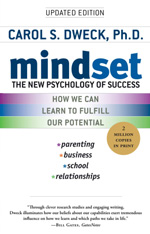Mindset: The New Psychology of Success
| Author: Carol Dweck, 2006 |
What's it all About?
Have you ever watched someone achieve great success in an area you’re still working on? How did it make you feel? Years ago, when I first started my own business, I would look at others with thousands of social media views or great post engagement and wonder why I wasn’t having the exact same results, even though I knew I was as good—or even better—as those other business owners.
This mindset changed when I got into Carol Dweck’s work, especially her 2006 book Mindset: The New Psychology of Success. Through this book, I really learned how to think differently when it comes to setting myself up for success.
In her book, Dweck talks about two different types of mindsets: growth mindsets and fixed mindsets. A fixed mindset is finite. With a fixed mindset, you think things like “either I have the talent, or I don’t” or “either I completely succeed or I completely fail.” Everything is about outcome, and people with fixed mindsets may be more likely to feel superior to others or be less tolerant of mistakes.
On the other hand, a growth mindset looks as all things as both possible and infinite. The talent isn’t there? Just not yet! Didn’t ace your presentation? You can figure out how to be better next time! Growth mindsets focus on learning from the process and coming up with a plan to do things different the next time. Mistakes and failures aren’t the end with this mindset, but instead important lessons.
One observation I found super interesting in Dweck’s work is the idea that we all have some level of a fixed mindset, though we might not always be aware of it. This is why we should always be listening for clues. For instance: when someone wants to approach something in a different way than you’re used to, how do you respond? Do you take the opportunity to try a new approach? Be staying aware of your mindset, you can catch yourself before you miss opportunities and find new outcomes through talking through ideas and approaches with others, even if you don’t think you agree with them.
During a recent speaking engagement, I had an encounter that challenged my own mindset when I got some feedback about my presentation. It wasn’t easy to hear that feedback and my first emotional reaction was “yuck!” But by practicing a growth mindset, I was able to move past my initial emotions and focus on what I learned from the feedback. Once I did this, a new weight was lifted and I felt excited about my next speaking engagement, where I’d have the chance to fix my old mistakes. Now, instead of worrying about what I might do wrong next time, I thrive off the idea of hearing ways to make myself even stronger.
With a fixed mindset, it’s easy to focus on quick success. When things happen easily, people with fixed mindsets are less likely to focus on what they learned and how they could be even more successful next time, and tend to move on without leaning into the opportunity to learn more.
Favourite Quotes
“It is not always the people who start out the smartest who end up the smartest.”
“If you are a somebody when you are successful, what are you when you are unsuccessful?”
“When people feel their basic qualities can be developed, failures may still hurt, but failures don’t define them.”
Biggest Takeaway
The growth mindset starts with YOU. If you can believe in change, then you can learn, though it is often hard work that requires trying different things. Your brain is a muscle—your most important one. Use it, stretch it, and let it rebuild and come back stronger with every new learning experience. If an experience does not go as planned, revisit it, learn from your mistakes, and adjust the process to set yourself up for success next time.
The beauty of changing your mindset is how it helps you at work and home. Once you drop the “good vs. bad” ideas of a fixed mindset and accept that people have different experiences in different areas, you’ll have more productive outcomes and a better setup for success. This all leads to better emotional intelligence, better self-management, and a great perspective on the bigger picture.
Reviewed by: Trevor Blondeel, February 4, 2022

